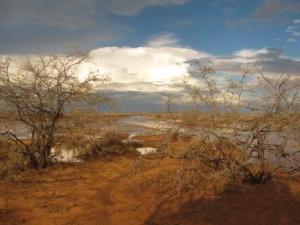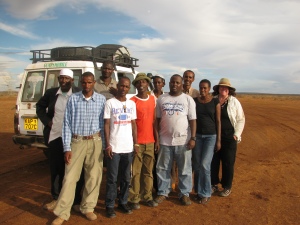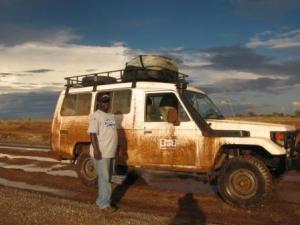By 4:15 a.m., Gumps is loaded and ready to go. We are headed back to the Samburu area where all of our Business Mentors will meet with the Dining for Women safari group. We will be collecting most of the Mentors along the way, though four that are on the main road will catch a lorry to Isiolo. Our morning departure team consists of the BOMA group — Kura, me, Omar and Semeji — as well as Hosea and Damaris of Mt. Kulal and Teresa and Benjamin of Loiyangalani.
As we drive out of the village, we pass Julius along the side of the road with his young son. He was waiting there in the dark, knowing that we would likely try to depart the village before dawn; he waves a thank you to me for personally providing funds for his son, who was born premature, to go to a special school. Julius is one of those educated young men of Loiy who have such great potential but in their boredom have developed a drinking problem. He is articulate and smart, and I offer small incentives for change each time I come. Kura is skeptical but he allows me to pick my causes without his influence.
I don’t know how Kura manages to climb up and over the rocks that line the shore of the Lake, especially in the dark, but he knows this road well and we make it to the top of the escarpment. As the sun starts to rise, I get one last glimpse of the beautiful lake and see a few of the fishermen coming in to shore on their rafts.
It rains off and on and this has Kura worried. “Mama Rungu, see the rain is coming down in the east, right where we have to cross the Kaisut. We may not make it.” I resort to my favorite coping strategy, denial, and we push on to South Horr where Stockwell arranges a breakfast of tea and njera at the Samburu Sports Club. Semeji sings some somber warrior songs as we make our way towards the mountains and the village of Ilaut where we will pick up Alinoor and William. As we pull up to the village, a group has gathered at Alinoor’s to see to them off. Now sitting in the two small jump seats in the back of the Landcruiser we have Alinoor (6 feet) and Benjamin (6 feet, 6 inches), and Omar and William. Hosea, Teresa and Semeji are in the back seat, and Damaris and I are in the front with Kura. Damaris has slept most of the way with her head on my shoulder.
Before we approach our next stop, we pass a project run by the AIC church that has brought nine German men to build a health clinic in the village. They have tents and a cooking tarp and it appears they have been here for at least two weeks. For me, it is one of the most insulting, gut-wrenching sights one can ever see in Africa. In a land where the men sit idle with no jobs, patronizing bleeding hearts come to Africa to have their feel good moment about “saving” Africa. I have given up suggesting to groups such as this that if they really want to help Africa, they should collect funds, send one construction manager to teach people building skills, and pay people to build their own health clinic. THAT is helping the people.
Africa does not lack for labor. Volunteers take jobs away from people willing to work, and in the process, as they witness western “saviors,” they become disempowered, lacking confidence in their ability to improve their own lives. I find the whole process patronizing and racist. It is not the first time that I have remarked to Kura that Africa is drowning in the western world’s good intentions.
We bounce along this route because I want to visit the remote villages of the Nemerai region. If BOMA’s goal is to improve opportunities for the poorest of the poor, then Nemerai is ground zero for us. We would not have funded these village businesses if it was not for John Galgithele, our Business Mentor from Korr, who asked that we bring the REAP program to Nemerai.
John lives in Korr but works as a nomadic children’s teacher serving the Nemerai region. He was the one who initiated the business applications in Nemerai and he is the one who will assume responsibility for the businesses there. When I first met John, he used to walk 22 km from Korr across the desert each Sunday and return on the same route every Friday afternoon. John now has a small motorcycle, which makes the journey shorter and also allows him to reach and mentor the Nemerai businesses.
We pick John up at the school and his two fellow teachers give us a tour and ask that I sign the guest book. One of the classrooms is used as a dormitory for the three teachers, and there are mattresses on the floor, as well as cooking pots and supplies of food. On the blackboard is the daily attendance: boys 105, girls 65, as well as the daily rations of food for each student. SFP Ration in kilograms: maize, 24.75 kg; pulses 6.6 kg; oil .8 litre; salt .5 kg. Food is free at school and it is a major incentive for attendance.
We visit three of the Rendille nomadic villages in Nemerai. Dubsahai is a village of 98 households and the business group here has to walk 22 km across the Kaisut to Korr to get supplies for their business. Muriton is the chairlady of the five-person group. She is a widow with seven children and admits that many people in the village use their children as child labor to make money. Now that she has an income from the business, she is proud to tell us that all of her children are going to school.
I do a quick interview of Muriton, check the group’s record books, and then we move on to Ongeli village, 30 km from Korr. There are 149 households in Ongeli and the group here has a well-stocked shop in a newly built hut. They tell me that they share the work of running the shop and one person is always in the store when the others make the trip to Korr with donkeys to buy supplies. They bring their nursing babies and pay a man 200 shillings to provide security.
I ask them if they are pressured to give credit and they tell me, “Of course, Mama Rungu, people in this village are very poor and hungry. We lost almost all of our livestock in the drought and people come to us at night when they have had nothing to eat. It is hard.” They show me a separate record book, maintained by a local student that documents the credit extended to village members. At the end of each month one of their members works to collect payment. By the time we reach the third village, after getting stuck up to our axles in clay, Kura is telling me we have to leave.
What is extraordinary about this group of villages is that they were recently featured on the “Jim Lehrer News Report” regarding the drought and famine, yet they have received few deliveries of relief food. Last week they received a minimal amount of food but the prior delivery to this was three months ago. To say that there is considerable inequity and corruption in the distribution of food relief would be an understatement.
Kura, John and I agree that we need to quickly respond by getting at least two businesses in each of the nine villages in the area. We were told in all three villages that “Mama Rungu, we need more food here” and on our way out to the main road we meet a CARE official who is collecting data on the drought and famine. CARE is piloting a food relief program that gives the poor cash instead of food and this would complement our micro-enterprise program. If CARE provides cash, the residents of the village will have the money to buy food from our local village businesses, providing a source of income for the women.
Everyone in these villages is so desperately poor; I hug the women’s bony bodies in some very sad goodbyes. It breaks my heart when they say, “We will pray for you, Mama Rungu.”
John is now the 11th passenger in the packed Gumps and we begin the treacherous crossing of the Kaisut. The temperature is 100-plus degrees and it rains off and on. We reach sections of the desert where it has rained hard and the road is a lake above a sucking mass of clay and sand. Kura shifts expertly and the gears whirr loudly. We take breaks on the dry sections and all pray that we do not get stuck. It is a long walk to the nearest village or road and if we get stuck, it will be an even longer night with the rain and mosquitoes. It is for this reason that we stopped in Ngurunit before the crossing, at the home of one of Kura’s other uncles who without hesitation arranged food for 11 of us. “We don’t know if we will be stuck in the Kaisut for a long time, Mama Rungu,” Kura tells me. Denial is such a beautiful thing.
It is a miracle that we finally reach the main road at sunset. Kura tells me that if we had crossed an hour later, the water would have sunk into the ground and the crossing would have been impossible. We regroup for a moment on the side of the road. The entire left side of my body is covered in mud – shirt sleeves, arm, face – from the flying mud because I refused to close the window in the stifling heat. A few hours later, we stop in Merrille to feed everyone as it is unlikely there will be food by the time we reach Isiolo. Kura brings me a cup of tea and tells me that this is not a safe place for me to eat.
The rest of the journey becomes a blur; Teresa and Semeji break out in song and soon the whole vehicle is singing loudly, encouraging Kura on so that he does not get sleepy. We pass a few lorries and I try not to think about the security concerns on this stretch of road. “Mama Rungu, are you OK?,” the Business Mentors repeatedly ask me as I am so quiet. I hate to admit to these people who experience travel like this on a regular basis that I am not feeling well. I’m not sure if it is the heat, something I ate, or maybe something else. We pull into Isiolo at 11 p.m., after 19 hours of travel. Kura drops me at the Bomen Hotel and we have a quick cash meeting so that he can provide each of the Business Mentors with stipends for expenses in Isiolo.
When I remove my clothes and change into a nightgown, I find out that I must have been bitten by something because I am covered in hives. Probably the reason that I had not been feeling well. I drink two litres of water with Benadryl and my malaria meds. The sparse room, with torn curtains and a thin sheet, is full of mosquitoes. I pull the malaria net around my bed, hoping to keep the angry mosquitos out.




